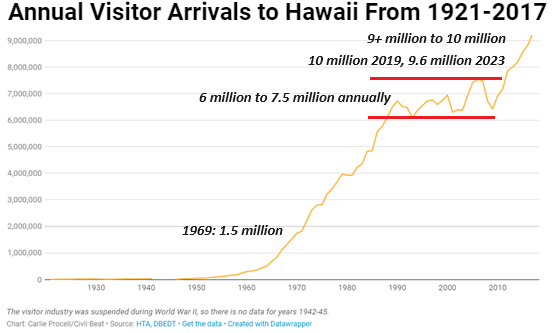Global Tourism: From Authenticity to Simulation to Dependency
You are receiving this post/email because you are a patron/subscriber to Of Two Minds / Charles Hugh Smith. This is Musings Report 2024-11.
I've lived my entire life in regions that are dependent on tourism to some degree for jobs and revenues, and as a tourist I've visited other regions similarly dependent on global tourism. In the most tourism-reliant areas, I've witnessed the economic consequence of this dependency, a transition from authenticity to simulation to hollowed-out dependency.
Much of the world has now reached this terminal state of hollowed-out dependency on a simulation of what was once authentic generating revenues from global tourism, generally to the detriment of the environment and local populace.
Both well-traveled tourists and those of us who live in tourist-dependent regions know the central irony of the expansion of global mobility / cheap airfares: what first attracted visitors has often been destroyed by the arrival of mass tourism.
In the initial stage of authenticity, the beautiful town square, the temple, the cathedral, the scenic bay, etc. all served the local populace. The few foreigners who arrived were embedded in a place and culture that served the resident populace. Tourists were already visiting Venice in the 1600s, for example, and Isabella Bird traveled in Hawaii in the 1800s; her account is titled Six Months in the Sandwich Islands.
As air travel became affordable to the masses circa the mid-1960s (the 747 jumbo jet entered service in 1970, vastly increasing the passenger capacity of airlines), famous destinations began harvesting tourist revenues by creating simulations of what had once been local and authentic.
Authentic dances were modified and performed daily to entertain tourists, local foods were modified to be mass-produced and palatable to tourist tastes, white-water rafting and kayak tours burgeoned in places that had once been quiet backwaters, shops catering to tourists replaced shops serving residents, and so on.
The end result: low-quality "authentic" frozen meals microwaved in overpriced cafes surrounding the square, temple or cathedral, tacky shops clog the streets, the local forests trampled and littered with trash, the reefs decimated and the local economy hollowed out by the arrival of global wealth and cheap imports.
In the initial influx of new revenue, the local populace favors tourism as a source of additional jobs and economic growth. I recall a sense of pride when Hawaii's annual visitor count exceeded 1.5 million in 1969.
But by the time the visitor count exceeded 10 million annually in 2019, residents no longer reckoned the benefits outweighed the costs and consequences, and when the pandemic shut down tourism in 2020, there was widespread relief, expressed as "We got our island back and it's wonderful."
Here's a photo of me and an empty beach when the pandemic stifled tourism:
The sense that tourism has gutted whatever made the city / locale attractive and vibrant is global: residents of Barcelona, Spain whom we know said mass tourism has ruined the city.
Large cities such as Paris, New York and Tokyo can absorb millions of tourists without losing neighborhoods--walk around the 16th Arrondissement in Paris, for example, and you won't encounter many tourists--but the floodtide of global wealth is distorting even the largest metropolitan areas, rendering housing unaffordable to the majority of residents.
The consequences are far more dire in small cities and locales. In the village of Hanalei on Kauai, Hawaii, for example, the average house near the famous bay is worth $5 million, and if it's on the beach, the price is astronomical. A typical mansion right on the bay rents for $32,000 a week.
The number of super-wealthy people globally is now so large that small places are quickly transformed into hollowed-out enclaves for the wealthy. This is a global phenomenon.
It's worth exploring this pernicious dynamic of authenticity decaying to simulation and then to complete dependence on global wealth and global supply chains in some detail.
Keep reading with a 7-day free trial
Subscribe to Charles Hugh Smith's Substack to keep reading this post and get 7 days of free access to the full post archives.



